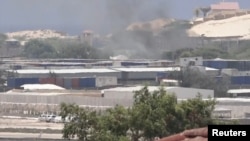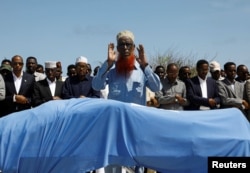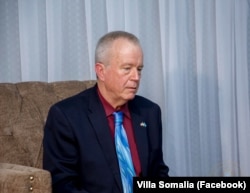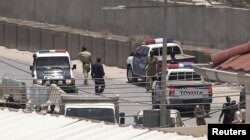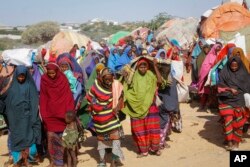U.S. Ambassador to Somalia Larry André has condemned a recent wave of attacks by al-Shabab militants across the country that killed more than 60 people.
Speaking to VOA Somali on Tuesday, André said the attacks in Mogadishu, Beledweyne and elsewhere were intended to prevent Somalia from moving toward stability.
"We condemn those who seek to murder and destroy," the ambassador said. "They are stopping the revival of Somalia and they're taking many lives in doing so. We support those who seek to build a secure, prosperous and peaceful Somalia. That is what our cooperation with the Somali authorities, with the Somali people, with Somali civil society is all aimed at."
A daring March 23 attack by al-Shabab on Mogadishu's heavily fortified airport killed at least seven people including five foreigners, according to Somali police spokesperson Major Abdifatah Aden Hassan.
On the same day, two deadlier explosions in Beledweyne claimed the lives of 48 more people including a female lawmaker, Amina Mohamed Abdi.
Al-Shabab attacks continued into this week as the militant group carried out a raid and roadside explosion in Puntland, killing five soldiers. Another attack on Tuesday night in the town of Wanlaweyn injured a security official and killed his teenage son.
André said stability in the Horn of Africa cannot be achieved without the revival of Somalia as a prosperous, democratic and peaceful country.
"And these acts of murder on a mass scale prevents achievement of that full revival," he said.
On the day of the attack on Mogadishu airport, al-Shabab fired mortars at the facility.
No casualties were reported, but Andre acknowledged that one of the mortars landed close to the U.S. Embassy.
"It also came close to the United Nations compound and landed in the United Nations compound, landed in the international compound and some landed at sea," he said.
Al-Shabab has increased attacks carried out by suicide bombers wearing vests, known as Person-Borne Improvised Explosive Devices (PBIED), a tactic the group has used for more than a decade.
The attack in Beledweyne was al-Shabab's third PBIED attack this year, following 11 such attacks in 2020 and 13 last year.
Police say the increase in al-Shabab's PBIED attacks is because police operations, surveillance and checkpoints have reduced the effectiveness of Vehicle-Borne Improvised Explosive Device (VBIEDs).
Andre said al-Shabab's attacks are indiscriminate.
"They often just kill indiscriminately. That is what they do. They are murderers," he said.
Droughts
The increased al-Shabab attacks come as Somalia tries to cope with a droughts that has killed tens of thousands of livestock and displaced tens of thousands of pastoral residents.
Somalia has declared a state of humanitarian emergency because of the drought. Aid workers are saying the situation is "catastrophic."
"Right now, there are 4.5 million people in Somalia who are being affected by the drought," said Tom Solomon, a senior humanitarian and development official with the U.S. Agency for International Development. "That includes 1.4 million children under the age of six, who are malnourished. And it includes 700,000 people who have left their homes in search of water and pasture for the animals."
Although the drought has affected the entire country, the central and southern regions are among the hardest hit, with the agro-pastoralists losing their livestock because of lack of water and lack of pasture, Solomon said.
"What has happened as a result is that people don't have enough food to eat; it's a real crisis because the price of food has gone way up [and] the value of animals that people sell has gone down," he said.
"We are concerned that there could be a fourth consecutive below average rainy season in Somalia with the upcoming rains. That would be unprecedented," Solomon added.
Solomon said the United States government remains a major humanitarian donor to Somalia. He said that last year, the U.S. provided approximately $430 million for humanitarian assistance and $210 million specifically for food assistance alone to Somalia.
VOA's Harun Maruf contributed to this report.
Editor’s note: An earlier version of this story incorrectly stated the amount of aid the U.S. provided to Somalia in 2021.




